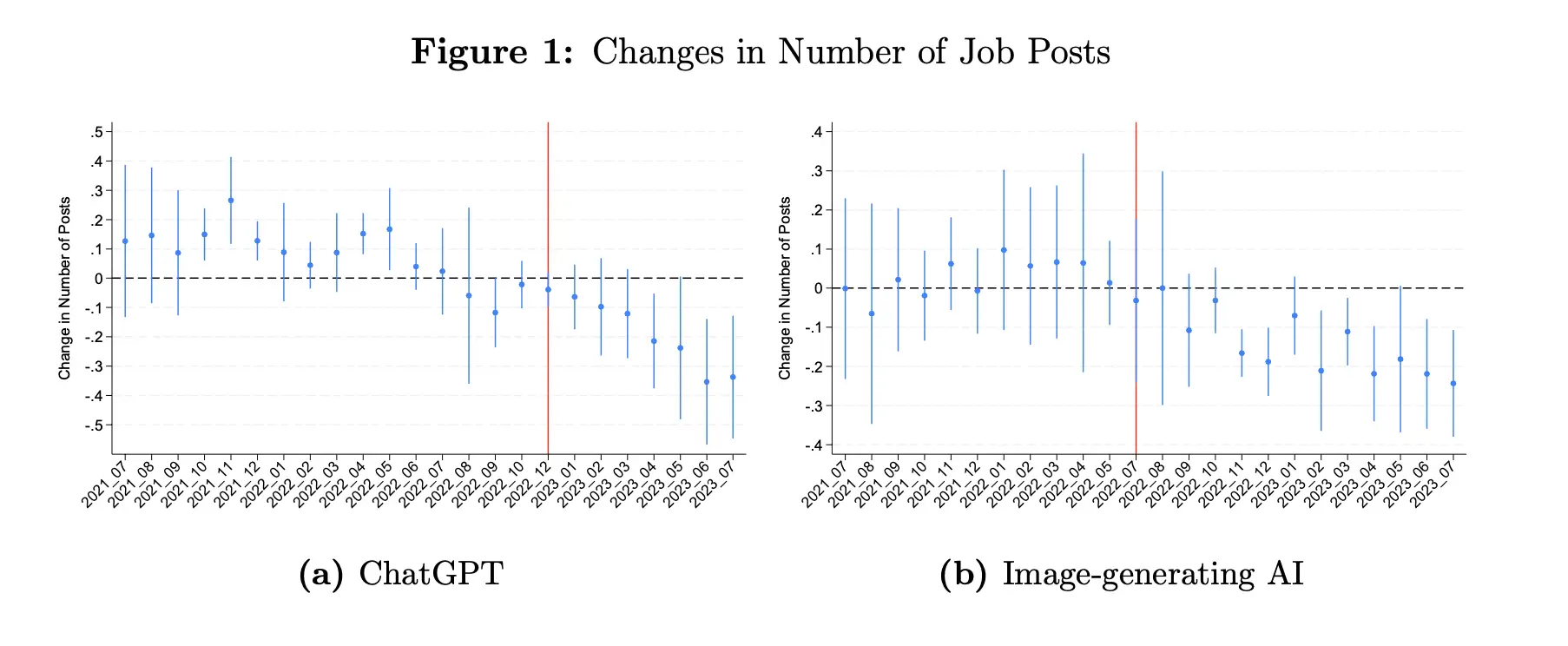ChatGPT at Work: Studies on the Impact on Work Practices, Job Landscape, and Freelancers

ChatGPT has been an integral part of many people's working lives for a year now. The extensive press coverage and numerous testimonials, despite the sometimes erroneous content, impressively underline the importance of these assistance systems. Initial studies show productivity gains through the use of ChatGPT, as these systems can provide support for a variety of tasks, but the impact on certain job roles can be serious.
An insightful study into the motivations of knowledge workers to use ChatGPT is "Why do people use ChatGPT? Exploring user motivations for generative conversational AI" from December 20231. This study shows how generative conversational AI meets a variety of user needs by overcoming the limitations of traditional conversational technologies - for example, by offloading cognitive or creative tasks to the technology. The majority of respondents cited productivity gains as the primary reason for using ChatGPT. The motivation to use ChatGPT to increase productivity in a variety of ways was clear, such as to find information quickly and easily, to generate text or assist with writing, or in software development to generate code or identify problems in code. Although to a lesser extent, ChatGPT is also used for creative work or learning, mainly because of its ability to simplify complex concepts and explain difficult topics in an easy to understand way.
In a study, MIT highlights the simplification of typical tasks such as summarising content and writing text, which can lead to time savings of up to 35%2.
Another study by Harvard Business School, in collaboration with Professor Ethan Mollick, who runs an interesting blog on the subject, shows that consultants using AI complete 12.2% more tasks on average, complete tasks 25.1% faster and achieve 40% higher quality results than those without3.
However, opinions on the quality of content delivered by ChatGPT vary widely and depend on the context. It has been found that ChatGPT performs better on creative tasks than on analytical ones. This largely depends on the domain and the extent to which the language model has relevant information. Therefore, in-house language models will be the next step to achieve better results.
Another area where large language models show their strength is in programming. I have personally been using this programming support for a year and the results are impressive. Dr Matt Welsh gives a provocative and exciting talk on the subject: "Large Language Models and The End of Programming" (https://www.youtube.com/watch?v=JhCl-GeT4jw), in which he argues that AI will eventually take over most of the programming work done by humans.
However, the productivity gains do not necessarily translate into more time for other tasks or more leisure time, but can also increase the pressure to produce more output or to completely replace the respective work roles. To this end, I have compiled a list of announcements and implementations on the employment effects of companies that have recently replaced jobs with AI.
Studies on the impact of generative AI on freelancers
In one of my blog posts I described how LLMs are having a major impact, especially for freelancers worldwide, as many of the services they offer on platforms like Upwork or Fiverr can increasingly be taken over by AI. These include services such as copywriting, proofreading, translation, design and illustration, as well as voice-overs, programming and data analysis.
Two studies show how the supply of freelancers on relevant platforms declined immediately after the launch of ChatGPT, but also of image-generating AIs such as Midjourney or Dall-E 2. In the study "Who is AI Replacing? The Impact of Generative AI on Online Freelancing Platforms" analysed data from a large global online freelancing platform.4 The study shows a 21% drop in demand for automated jobs compared to manual jobs after the introduction of ChatGPT. There was also a 17% drop in graphics and design work after the introduction of image-generating AIs.
What is striking is the speed with which companies have responded as customers for jobs on these platforms. The red line in the graph shows the threshold for the introduction of AI tools.

The study "The Short-Term Effects of Generative Artificial Intelligence on Employment: Evidence from an Online Labour Market" also found a decline, but to a lesser extent.5 Orders fell by 2% and monthly earnings by 5.2%. Since the introduction of generative AI, the researchers observed a consistent negative impact on freelancer supply, both in terms of the number of jobs and total compensation. Another notable finding of the study is that the 'top' freelancers are particularly affected by the changes. It seems that even higher qualifications offer no protection against being replaced by AI technologies. However, the authors of the study do not provide any explanations for the underlying causes.
Given these developments, it is hardly surprising that the CEO of the freelance platform Fiverr wrote a blog post at the beginning of 2023 in which he wishes for a coexistence between human talent and AI. But the decline in orders on Fiverr tells a different story.
See also the: Examples of job reduction through automation and generative AI.
Footnotes
- Marita Skjuve, Petter Bae Brandtzaeg und Asbjørn Følstad, "Why do people use ChatGPT? Exploring user motivations for generative conversational AI", 2023, Link. ↩
- Shakked Noy and Whitney Zhang, "Experimental Evidence on the Productivity Effects of Generative Artificial Intelligence", 2023, Link. ↩
- Fabrizio Dell'Acqua, Edward McFowland, Ethan R. Mollick, Hila Lifshitz-Assaf, Katherine Kellogg, Saran Rajendran, Lisa Krayer, François Candelon und Karim R. Lakhani, "Navigating the Jagged Technological Frontier: Field Experimental Evidence of the Effects of AI on Knowledge Worker Productivity and Quality", 2023, Link. ↩
- Ozge Demirci, Jonas Hannane und Xinrong Zhu, "Who is AI Replacing? The Impact of Generative AI on Online Freelancing Platforms", 2023, Link. ↩
- Xiang Hui, Oren Reshef, John M. Olin und Luofeng Zhou, "The Short-Term Effects of Generative Artificial Intelligence on Employment: Evidence from an Online Labor Market", 2023, Link. ↩